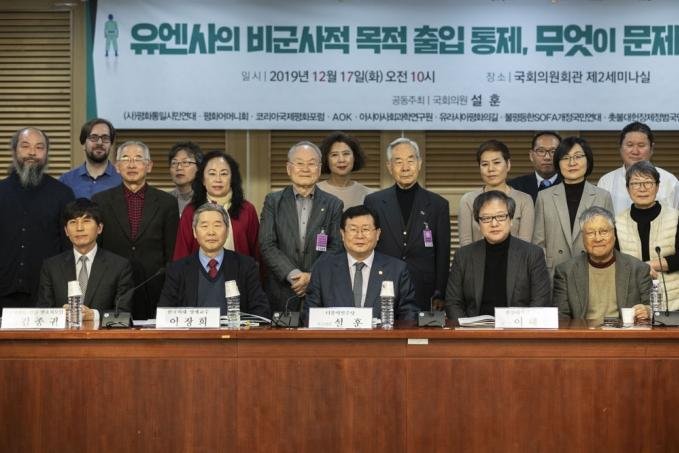Rep. Sul Hoon of the ruling Democratic Party, (C front row), poses with other participants at a forum Tuesday in Seoul on the U.N. Command’s right to control access to the Demilitarized Zone. Photo by Moon Jae-won/UPI News Korea
SEOUL, Dec. 18 (UPI) -- A South Korean lawmaker organized a forum to question the authority of the U.S.-led U.N. Command to control access to the demilitarized zone separating the two Koreas.
Rep. Sul Hoon of the ruling Democratic Party held the forum Tuesday at the National Assembly in Seoul along with experts including Professor Lee Hae-young of Hanshin University and Cheong Wook-sik, director of the civic group Peace Network.
The UNC was established in 1950 to support South Korea during the Korean War (1950-53). After enforcing the armistice to end the three-year war, the UNC has exercised the right to issue or deny permits to enter the heavily fortified DMZ.
"As a legacy of the Cold War, the UNC is too outdated. It is a 'ghost army' of the U.S., by the U.S., and for the U.S.," Lee said. "The truce accord does not include any clause which forces South Korea to give up its control over the DMZ and transfer it to the UNC."
Lee said the Seoul administration has to deal with the issue through lawsuits or direct negotiations with Washington.
Cheong recommended a phased solution, first strengthening South Korea's control over the DMZ before eventually disbanding the UNC by signing a peace treaty between the two Koreas.
The issue was raised in October, when Unification Minister Kim Yeon-chul said during a parliamentary audit that the UNC may lack legal grounds to ban DMZ access for non-military purposes.
The UNC countered that the multinational command disallows access to the DMZ only when the requests do not have all the required documents or when they seek to enter unsecured areas.
The UNC said it approved more than 93 percent of about 2,200 requests to access the DMZ that it received over the past year.
However, critics cite examples of controversial decisions.
They claim the UNC delayed the inter-Korean railroad connection project in 2018 by denying the Seoul government's request to enter the DMZ. Kim also canceled his visit to the buffer zone in August after the UNC did not let journalists accompany him.
Sul, a fourth-term assemblyman who is also a member of the governing party's supreme committee, hoped that the forum will help grapple with the thorny issue.
"I hope our efforts will lead us a step closer to peace and prosperity in the Korean Peninsula as well as the unification of the two Koreas," he said.















